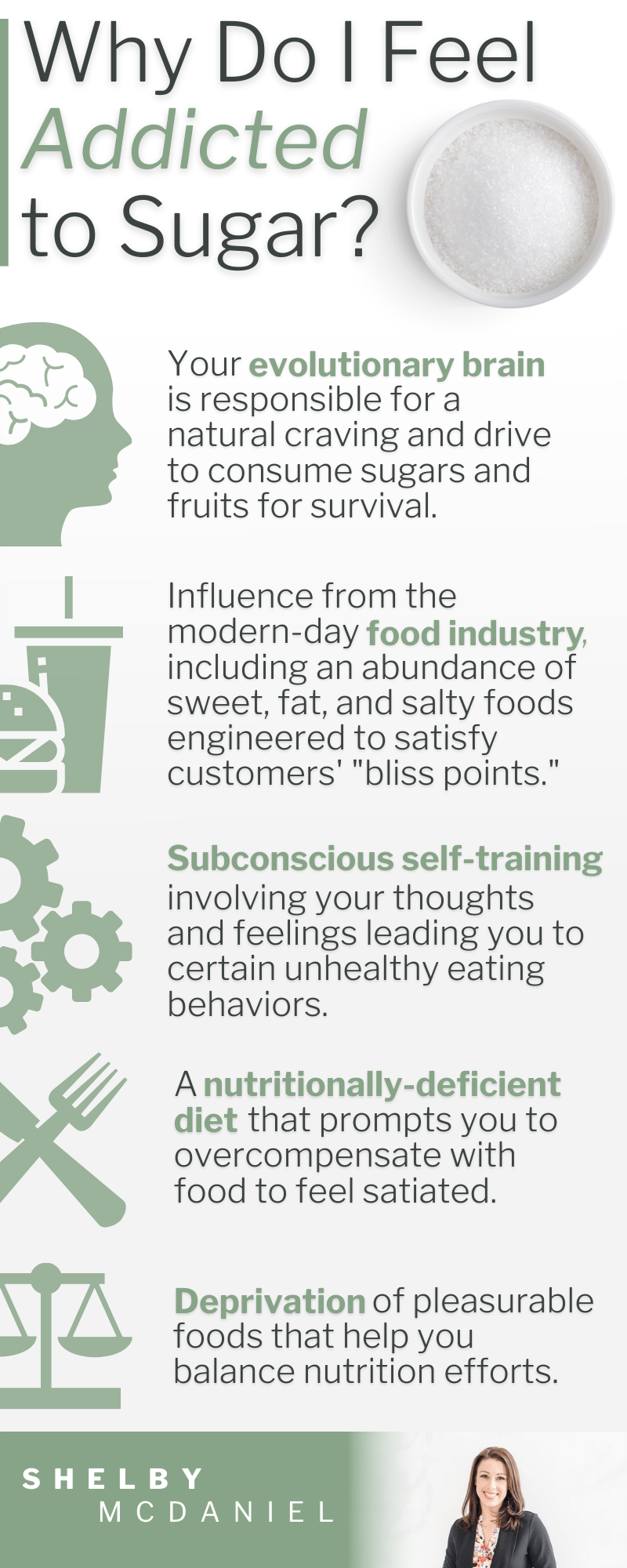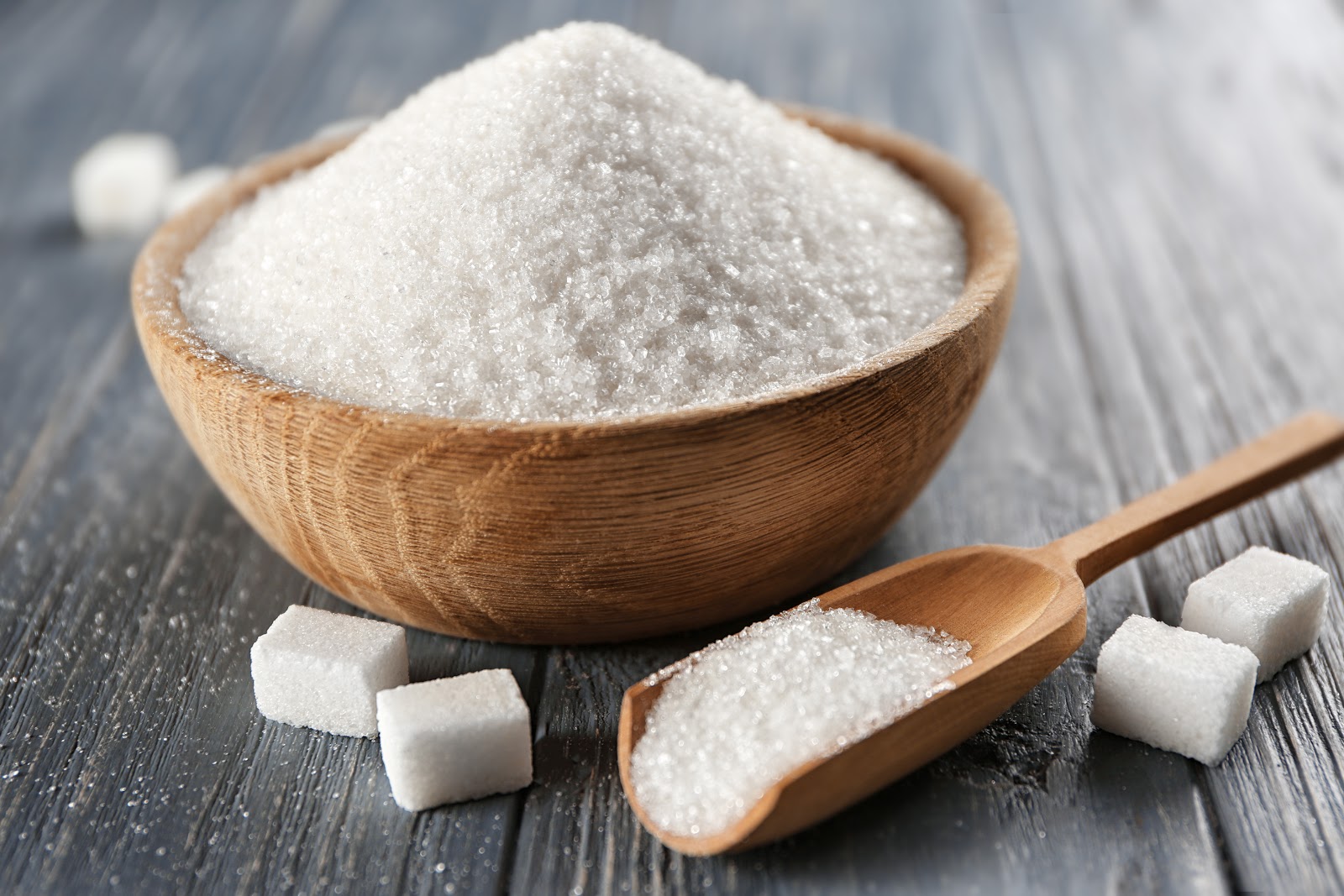Do you feel addicted to sugar?
Believe you are addicted to sugar?
Always craving something sweet?
I hear it ALL the time from my clients:
“I am addicted to carbs.”
“I am addicted to sugar.”
“I am addicted to food.”
Prior to working with me, my clients have had therapists, programs such as Food Addicts Anonymous, or self-development books convince them that they are food or sugar addicts. Aaah! So frustrating!
Let’s poke holes in this belief system that you are a sugar or food addict by diving into some dynamic eating psychology.
Why Do I Feel Addicted to Sugar?
#1 Your Evolutionary Brain
There are many good reasons why your body strongly craves sugar, starting with your evolutionary brain! Did you know you actually have a genetic preference for sweet foods? Yep! Starting at the very beginning of life with mother’s milk. In our primitive hunting and gathering days, our ancestors learned that any foods in nature that were sweet, rather than bitter, were not poisonous. Therefore, the brain learned sweets = safe. Sweeter, high-calorie foods like fruits were essential for survival and were not usually available year-round, unlike today, where you can practically get any seasonal fruit and carbohydrate at any time of the year. Winter used to be a time where gathering food was difficult and a time when higher caloric foods like sugary fruits were unavailable. Therefore when these high-carbohydrate, sugary foods were available, the brains sensed, “Summer is here! Better stock up now while it’s still available so I can store up for winter!” The primitive response was a natural increase in cravings and drive to consume sugars and fruits to stock up on body fat, which was an essential means of survival for the upcoming scarce winter months. And that drive is still within us today, millions of years later!
Unfortunately, the brain doesn’t know that Whole Foods, Super Walmart, and Costo (and others) are now available all the time, and our brain doesn’t know winter isn’t around the corner when you’re eating sugar year-round. So this is not a willpower issue, it’s not about addiction. It’s simply how your brain is designed to crave and want more sugar because that was previously an evolutionary advantage.
#2 Our Sneaky Food Industry
Our sweet taste buds are on your tongue to make you feel good and for food to taste pleasurable, so you eat and don’t die. It’s as simple as that! You know who else knows that? Our very good friends in the food industry. They are geniuses surrounding what lights up our brain and understand that we have what they call a “bliss point” when it comes to eating certain foods. It’s the ideal combinations of fat, salt, sweet, crunch and/or other flavor X factors that “hook us” – and drive the brain to call for more.

Does that mean you can get “addicted” to food?
Some use the term “addicted,” but that is a loaded term. In Dynamic Eating Psychology, there is a significant distinction between a food addiction and being a food addict. In nearly all cases of food addiction, the eater has a physiological or emotional addiction to a specific food or a substance within the food (such as sugar, salt, or fat). Labeling oneself as a food addict can lead to a fearful, if not antagonist relationship with food in general.
Food addiction occurs when a particular food or substance hijacks our normal brain chemistry response (thank you, food industry) and literally takes over and compels us toward over-consumption of that food, consequently creating health problems and weight gain. Food addiction, however, is not the same as being addicted to alcohol, drugs, tobacco, sex, media, or other external stimulants. You require food to survive; by that token, you cannot be a food addict. Classifying yourself in this way can create an addiction consciousness and set you up for a lifetime of battling food and diverting life energy to managing your addiction while also, in some ways, keeping you connected to it.
What is important to know is that foods can be engineered to hook you, so you eat more. There’s a tremendous amount of science, research, expense, and brainpower that (sadly) goes into figuring this all out. Classic junk foods are highly engineered in this way. Researchers know excess sugar will stimulate the brain in a “feed-forward loop” to want more food. Soft drinks designed to “quench thirst” that are highly sugared do no such thing and actually drive the brain to want more.
Basically, we are at a disadvantage of being trained and conditioned to overeat on engineered foods, especially sweet foods. You just learned how our drive for sugar dates back to our ancestors millions of years ago as a means for survival, and unfortunately, the food industry takes very, very good advantage of this. This does NOT mean you are a sugar or food addict.
Still, it is important that you are aware of the manipulation in our food industry, respect the power lower quality highly engineered foods can have on the brain, and begin to incorporate higher quality foods into your diet on a more frequent basis.
#3 You’re a Good Trainer
Our brain is conditioned every day by the things you see, experience, feel, and interpret, causing subconscious hardwiring to take place without you even knowing it. This hardwiring determines how you see yourself, the world, your decision making, and creates wanted and unwanted behaviors in all areas of your life. Your brain is like a self-learning computer. It learns A (thoughts) = B (Feelings) = C (DO THIS – The Outcome). Train it well enough, and everything becomes automated, for example:
“This job sucks” = Feel mad = I EAT SUGAR
“Let’s celebrate” = Feel happy = I EAT SUGAR
“Oh, screw it!” = Feel sad = I EAT SUGAR
“I’m stressed about work” = Feel overwhelmed = I EAT SUGAR
You do this over and over enough your brain will learn that “oh, well, when I’m mad, eat sugar!” or “When I feel defeated, eat sugar!” and *BOOM* you wonder how you mindlessly found yourself at the bottom of the pint of ice cream.
The brain is meant to learn from repetitive training (by you) and automate it so it can operate on a subconscious level about 90% of the time; why? To save you energy from having to think about every single thing you do every single day.
See, this isn’t about will power either, and again you’re not addicted to sugar; this is simply about retraining your brain! So to rid these unwanted urges and eating behaviors (the outcome), you’ve got to reverse engineer and overhaul the very THOUGHTS (A) that are driving your urges and feelings (B) that lead to your unwanted eating behaviors (C).
#4 Nutritionally Deficient
Your body has a LOT of wisdom. Sometimes we crave sugar because literally, your body needs carbohydrates to function! Oftentimes when we are dieting and trying to lose weight, what is the first thing we tend to cut…CARBS! Carbs break down into sugar because sugar is the body’s primary energy source. Your brain needs sugar, and your cells need sugar to support your immune system, cardiovascular system, digestion, recovery, muscle building, motor skills, and MORE. And when all of a sudden it doesn’t get sugar for 10 hours because you jumped on the latest carb-cutting craze, it’s gonna say, “Hey, what the heck? I need sugar!” and your body will crave it! So if this sounds familiar, lean INTO your body’s call for high-quality carbohydrates (including fruit) to help give your body what it truly needs!
If you are not trying to cut the carbs yet you are craving them, your body may be experiencing A) excess poor quality carbohydrates (which increases the primal drive for more) or B) low intake of high-quality essential fats or protein in your diet. Explore with some changes in either and see how your cravings improve!
#5 You Feel Deprived
When you are trying to “be good” to lose weight, control your overeating, emotional eating, or binge eating, you tend to eat what you “should” rather than foods that BOTH truly nourish you and bring you pleasure. So if you have been eating bland, boring, diet foods all week with zero pleasure, and that cookie, ice cream, or candy crosses your path, of COURSE you’re going to be going for something that you find truly interesting and enjoyable! It makes perfect sense! It’s like you’re breathing stale air for five days, and your first opportunity to get fresh air is a no brainer jump to get some! In this case, again, you are not addicted to sugar or are a food addict; you just need to ensure you are finding more balance with the foods you are choosing and bring a little more pleasure into all of your eating experiences.
I hope the above was helpful for you! If you feel that you have an addictive relationship with certain foods, then check out my various coaching programs that are here to help you incorporate powerful Dynamic Eating Psychology techniques that will break these habits quickly and help you find your way to a healthier relationship with eating.
Enjoy this article? Join the movement to change the conversation around food and diet culture by sharing this post!
Sources: Institute for the Psychology of Eating, Module 03 Part 4 of 4: Overeating. Accessed December 2020.


